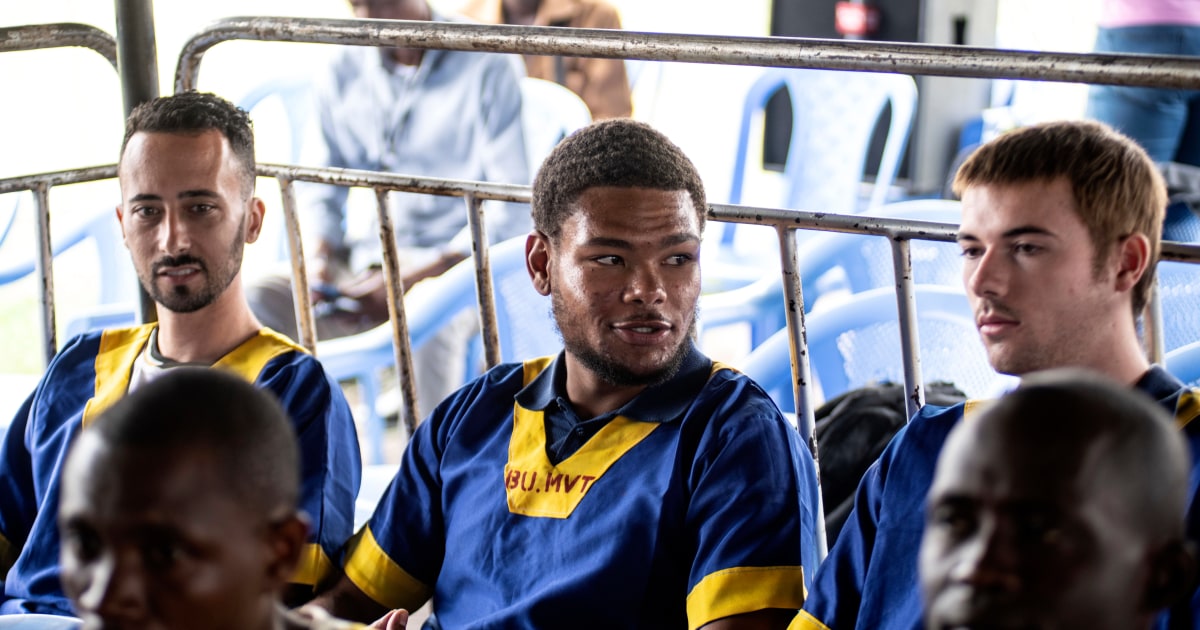When 21-year-old Tyler Thompson boarded a plane in Utah this April, his stepmother, Miranda Thompson, thought he was bound for South Africa, traveling with his high school buddy, Marcel Malanga, on a once-in-a-lifetime trip to explore the world.
Instead, he was entangled in the deluded efforts of a self-styled warlord to overthrow the president of the Democratic Republic of the Congo, one of Africa’s largest nations, in a series of events that unfolded over five months and ended with his death sentence, delivered by a Congolese military court on Friday.
Thompson, Malanga and 35 others, who were convicted of taking part in the botched coup, were charged with terrorism, murder, criminal association and illegal possession of weapons, among other charges.
Thompson’s family — who told the BBC in June that they had “zero idea” how he ended up in the DRC — said the verdict had left them “heartbroken,” and that they continued to believe in his innocence. Malanga’s mother, Brittney Sawyer, also says her son is innocent.
State Department spokesperson Matt Miller said, “We understand that the legal process in the DRC allows for defendants to appeal the court’s decision,” and that the U.S. would not pass judgment yet. Embassy staff would continue to attend the proceedings and follow developments.
The U.S. government has not declared them wrongfully convicted, making it less likely that officials would try to negotiate their return.
They were convicted alongside another American, a British citizen, a Belgian, a Canadian and Congolese co-defendants. The lawyer who defended the foreigners said he would appeal their verdicts.
But between the coup and the sentence, it remains unclear exactly how two young men from Salt Lake City found themselves embroiled in a plot to overthrow a government 8,500 miles away.
Five years ago, while playing for the Copper Hills High School football team, Thompson met Marcel Malanga, the son of Christian Malanga.
The elder Malanga was born in the DRC but moved to the U.S. with his family in the 1990s as a refugee and later became an American citizen, according to BBC Pidgin. He had sold used cars and dabbled in gold mining in the U.S.
After a stint back in the DRC, where he joined the army and became disillusioned, Malanga created a government-in-exile in Brussels in 2017, calling it the New Zaire Movement. He proclaimed himself president of the United Congolese Party and railed against what he saw as vast government corruption in the DRC.
On May 19, he assembled a ragtag band of a few dozen paramilitaries, leading them in an extraordinarily ambitious yet ultimately amateurish attempt to unseat Congolese President Felix Tshisekedi.
The attempted coup began in the early hours before dawn as armed men attacked first the home of parliamentary speaker Vital Kamerhe, before they headed to the president’s official residence.
Witnesses say a group of about 20 assailants attacked the palace before an exchange of gunfire, while Christian Malanga livestreamed video showing him surrounded by men in military uniforms.
Standing next to his son, Christian Malanga said the Congolese military is tired of the president, who he says has “messed up the country and must leave office.”
Within hours, Christian Malanga was shot dead after resisting arrest, according to Congolese authorities. Five others were also killed.
Some 50 others were then arrested by Congolese forces. Among them were Thompson, Malanga’s son Marcel, and 36-year-old Benjamin Reuben Zalman-Polun, a convicted drug trafficker from Maryland.
The trio were brought to a high-security military prison in the capital Kinshasa and pictured with shaved heads in jail uniforms. Videos taken in Kinshasa after the aborted coup showed Thompson being hit with the butt of a rifle by security forces.
Back in West Jordan, Utah, a suburb of Salt Lake City, residents could scarcely believe their lives had become so closely intertwined with a coup d’etat in the DRC.
Thompson’s family say they believed their son was going on a free vacation, and that they had no knowledge of the elder Malanga’s intentions. Thompson’s stepmother said she thought he and the Malangas were visiting South Africa and Eswatini.
“We have no idea how he got mixed up in all of this. He was on vacation with his friend’s family, and the next thing we know is he’s been arrested in the DRC,” she said in a social media post.
The U.S. State Department strongly advises against travel to Congo, warning of crime and civil unrest.
Sawyer, Marcel Malanga’s mother, says her son is innocent and was swept up in events outside of his control. “This was an innocent boy following his father,” Sawyer wrote in a Facebook post in June.
Malanga has said his father threatened to kill him and Thompson if they did not take part in the coup.
But Malanga’s teammates shared concerns that he had recruited Thompson under false pretenses. Several players told The Associated Press that they had also been invited to travel to the DRC on a trip that was pitched interchangeably as a family vacation or a service trip to build wells. Others have alleged that Malanga offered up to $100,000 to serve as security guards for his father.
They said Thompson was the only former teammate to accept the invitation.
Zalman-Polun is reported to have known the elder Malanga through a gold mining company.
Congo reinstated the death penalty after more than two decades in March, citing the need to remove “traitors” from the army as authorities struggle to curb militant attacks in the nation. However, no death penalties have been carried out since.
Should the penalty be carried out, the men convicted would likely be executed by firing squad.


